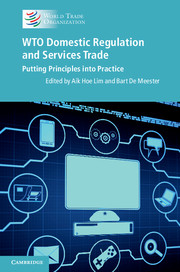Book contents
- Frontmatter
- Contents
- List of contributors
- Foreword
- Disclaimer
- Acknowledgements
- List of abbreviations
- 1 An introduction to domestic regulation and GATS
- Part I Impediments to services trade, regulatory theory and principles
- Part II Legal perspectives on WTO principles and domestic regulations
- Part III Case studies
- Part IV Concluding remarks
- 19 Services liberalization, negotiations and regulation: some lessons from the GATS experience
- 20 Addressing the domestic regulation and services trade interface: reflections on the way ahead
- Index
20 - Addressing the domestic regulation and services trade interface: reflections on the way ahead
Published online by Cambridge University Press: 05 April 2014
- Frontmatter
- Contents
- List of contributors
- Foreword
- Disclaimer
- Acknowledgements
- List of abbreviations
- 1 An introduction to domestic regulation and GATS
- Part I Impediments to services trade, regulatory theory and principles
- Part II Legal perspectives on WTO principles and domestic regulations
- Part III Case studies
- Part IV Concluding remarks
- 19 Services liberalization, negotiations and regulation: some lessons from the GATS experience
- 20 Addressing the domestic regulation and services trade interface: reflections on the way ahead
- Index
Summary
Introduction
The contributions in this book have been wide-ranging. Parts I and II combined economic and legal perspectives on the purpose of regulation, its potential impact on trade and the relevance of existing World Trade Organization (WTO) principles in addressing trade effects that may arise from domestic regulation. Part III supplemented this discussion with country and sector-specific case studies illustrating a particular regulatory experience or challenge. While these case studies cannot be considered to be exhaustive, they do provide some insight into the problems of the type discussed in the WTO negotiations on domestic regulation disciplines. In particular, the case studies raise a number of recurring issues. These, when considered against the discussion of WTO principles in Part II, provide a form of ‘reality check’ on how the unfinished business of developing domestic regulation disciplines have been addressed and whether there are other approaches or issues that should be considered.
Themes emerging from the case studies and essays
A basic purpose of this book has been to improve understanding of the regulatory issues faced in services sectors as well as their potential impact on trade. In doing this, we have sought to document significant experiences or accounts of how governments and regulatory and supervisory authorities have dealt with services liberalization and regulation as a practical challenge. We have not sought to distil ‘best practices’ out of the essays and case studies collected in this book, as there is still much to be learnt about the trade and regulation interface. However, we did find that while many of the concerns and regulatory practices are specific to the context of the individual case study, the issues raised appear to have wider significance either for all services sectors or for certain subsectors.
- Type
- Chapter
- Information
- WTO Domestic Regulation and Services TradePutting Principles into Practice, pp. 332 - 351Publisher: Cambridge University PressPrint publication year: 2014
- 3
- Cited by



